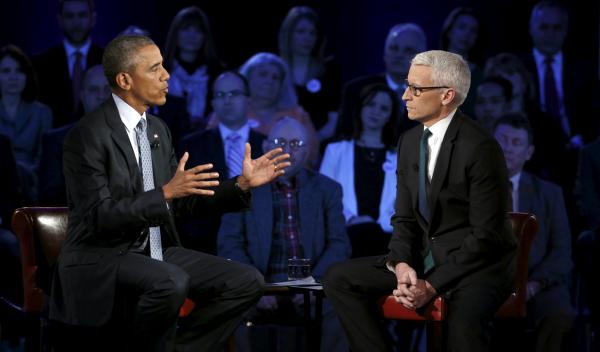“Our friends by necessity”. This is how Max Boots, a columnist for the Los Angeles Times describes Saudi Arabia in an article regarding the latest diplomatic tussle between Riyadh and Tehran. His advice is that although Americans don’t like Saudi Arabia, the Obama administration should back Riyadh against the Iranian mullahs.
However, that view is disputed by the New York Times which claims that since world public opinion, especially in Europe, is more favourable to Tehran, the US should take Iran’s side. Such a move would be in line with President Obama’s strategic decision to help Iran build its position as the regional power in the Middle East.
The Iranian media liked the New York Times’ position so much that the daily Kayhan published by the office of the “Supreme Guide” made the position its main front-page headline on Wednesday.
Writing in the Bloomberg magazine, Eli Lake believes that Obama has already tilted towards Iran. The view is echoed by the New York Post which blames Obama for having in a sense provoked the crisis by encouraging Iran’s “expansionist ambitions”.
All in all, the coverage of the diplomatic tussle that followed the execution of Shiite militants in Saudi Arabia highlights a certain anti-Saudi sentiment in the US media. Call it Saudiphobia, if you like, but the sentiment has been present, at least in filigree for decades.
It is promoted by three factors. The first is that the American media elite, like media elites in other Western democracies, has always had a soft left or “liberal” and “progressive” bias for which traditional societies such as Saudi Arabia or for that matter Iran are either unacceptable anachronisms or adversaries of Western “values.”
The second factor is that the US media has always harboured some sympathy towards nations that cultivate some form of anti-Americanism within limits. As a nation that has made anti-Americanism one of its shibboleths, Iran benefits from that bias. Saudi Arabia, in contrast, has been a friend of the US, if not a formal ally, since 1945 and is thus criticized more harshly. Obama merely expresses that approach by flattering the adversary, Iran, and criticizing the friend, Saudi Arabia. Since a good part of the US media is still pro-Obama, that approach is duplicated in soft-soaping Iran and hard-hitting at Saudi Arabia.
The third and, perhaps, most important factor is that the Saudis have never had a coherent media strategy in the US. The US is a democracy in which public opinion matters because, in most cases, it is the ultimate arbiter of policy. Saudis, however have always worked through networks of contacts as is often done in societies where power clans, influential families or well-entrenched government machines matter more than public opinion.
That method could work well in Pakistan, for example, or China or, paradoxically, even in Iran. But it doesn’t work in a society like the US where the free flow of information and open, almost endless debate on all issues, provide the life-blood of decision-making. In such a context direct contact is needed.
That, in turn, requires a strategy that cannot be worked out by Madison Avenue firms, former US ambassadors to Riyadh, oil company contacts and self-styled influence “fixers” eyeing Saudi chequebooks. For decades Saudis believed that their close contacts with the Bush family and a few senators and Congressmen was all that was needed to secure them a fair hearing in the court of American public opinion. That illusion was not challenged because, at the time, the Kingdom did not face the kind of challenges it does today.
For obvious cultural and ideological reasons, regardless of how Saudi Arabia is marketed in the US, it is unlikely to secure affection, let alone love. But it could secure some understanding and, perhaps, even a measure of respect if only because, compared to all the 22 members of the Arab League, the Saudi experience overall has been relatively positive.
A milder form of Saudiphobia could also be observed in the Western European media. Here, too, ideological positions play the key role. The European left regards Saudi Arabia as a putative ideological adversary but considers the Khomeinist regime in Tehran as a potential, if not actual, ally. Khomeinist Iran has played the anti-American cad which is also sued by the remnants of Communism and a wide array of other leftist groups.
In Britain, for example, all newspapers on the soft-left of the spectrum, the Guardian and the Independent have attacked the Saudis in violent terms while giving the Islamic Republic in Tehran the benefit of the doubt. The latest executions in the kingdom are highlighted and criticized while the fact that Iran is now world number-one in executions is conveniently ignored.
In contrast, newspapers on the soft-right, the Times or the Telegraph for example, have been more measured in their positions regarding the kingdom. Some have even mentioned the Islamic Republic’s long record of attacking embassies and seizing foreign diplomats as hostages.
In the current tussle, Tehran enjoys another advantage. Part of the Arabic and Persian-language output of US, British and French state-owned media is produced by journalists ideologically hostile to the kingdom and, in some cases, sympathetic to the so-called “moderate” faction in Iran.
Regardless of the merits of the current situation, the Saudis are certainly not getting what they hoped for as a friend and ally of Western democracies. No amount of sulking about Saudiphobia will change that until the Saudis understand that this is a different game in which they have little experience, a game that “allies” cannot play on their behalf as they did in the past. They have to play it themselves. And for that they have to learn the rules and the techniques.
